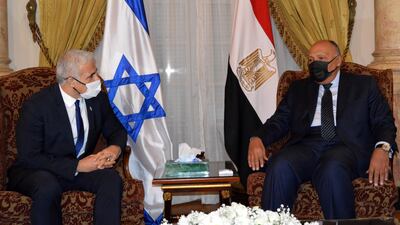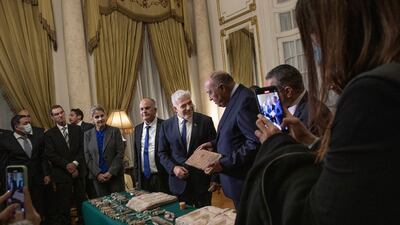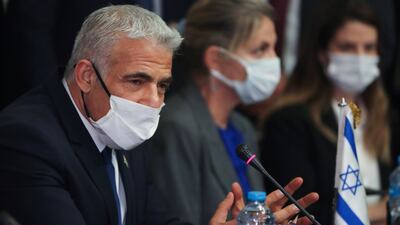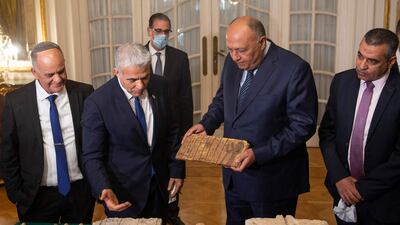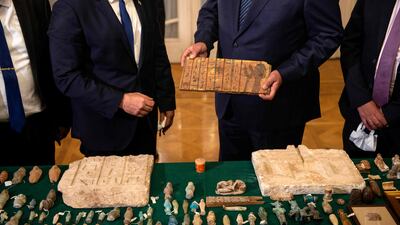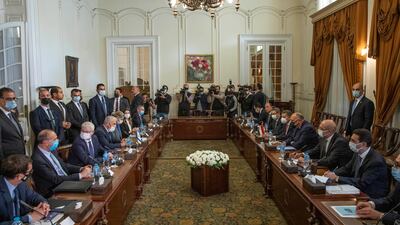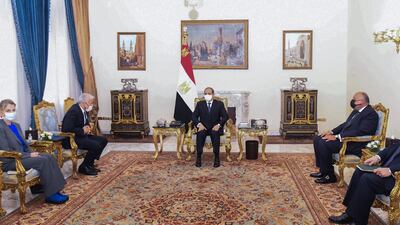Israeli Foreign Minister Yair Lapid and Egyptian President Abdel Fatah El Sisi discussed a long-heralded prisoner exchange with the militant Palestinian group Hamas, relations between the two Middle Eastern neighbours and Iran's nuclear programme.
“Egypt is an especially important strategic partner for Israel. My goal is to strengthen our security, diplomatic, and economic relations with Egypt,” Mr Lapid said on Thursday, after he met the Egyptian leader in Cairo. “It’s important to continue to work on the peace between our two nations.”
The Egyptian presidency said Mr El Sisi and the Israeli minister discussed bilateral relations and regional issues, especially the Palestinian question. The Egyptian president discussed with Mr Lapid Cairo's efforts for the reconstruction of Gaza and its continuing work to defuse tension between Israel and Hamas.
The Israeli Foreign Ministry said the two discussed what it said were “Iran's attempts to become a country with a military nuclear capability as well as its continued use of terrorism, and the threat this poses to the Middle East.” They also discussed the situation in the Gaza Strip.
“Minister Lapid presented the president with his 'Economy for Security' plan, especially addressing the issue of captives and missing persons,” it said.
Mr Lapid told Mr El Sisi of “Israel's desire to deepen the peace between our countries in the civilian fields of economics, energy, agriculture and trade,” the statement said.
Mr Lapid's visit to Cairo is the latest evidence of closer ties being forged between Egypt and Israel, more than 40 years after they signed a peace treaty that ended three decades of hostilities.
The visit by Mr Lapid followed talks between Mr El Sisi and Israeli Prime Minister Naftali Bennett at the Red Sea resort of Sharm El Sheikh in September. Mr Bennett was the first Israeli leader to make a public visit to Egypt in a decade.
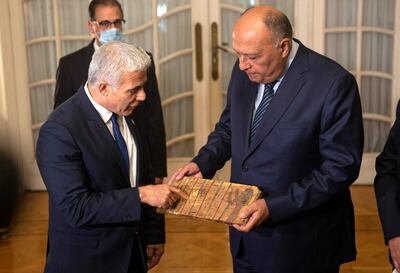
The visit also follows last month's landmark agreement between Egypt and Israel that allows Cairo to increase the number of troops it has in the north-east corner of the Sinai Peninsula, where Egyptian security forces have battled Islamic militants for years. The two countries have also been co-operating closely on security along their border and combating human and narcotics trafficking.
Egypt in 1979 became the first Arab state to sign a peace treaty with Israel, but relations between the two former foes — they fought three wars between 1948 and 1973 — were labelled as a “cold peace.” However, relations have become significantly warmer in recent years.
In a show of the close ties now binding the two nations, Mr Lapid, in co-operation with the Israel Antiquities Authority, returned Egyptian archaeological items seized in Israel, the Israeli and Egyptian foreign ministries said.
The Egyptian foreign ministry said Mr Lapid returned a total of 95 antiquities that had illegally left the country. Among the items are parts of inscriptions on stone in hieroglyphic writing, a fragment of a wooden sarcophagus bearing Egyptian writing, inscriptions on papyrus, figurines of Egyptian goddesses, and Oshabtim — figurines usually placed inside tombs as burial offerings.
The return of the pieces followed a meeting between Mr Lapid and Sameh Shukry, his Egyptian counterpart.
The prisoner exchange between Israel and Hamas, if it goes ahead, would strengthen the Israel-Hamas truce that ended their latest war in May and boost efforts to launch reconstruction in the Gaza Strip.
According to Israeli media reports, Hamas is holding two Israeli civilians — Avner Mengistu and Hisham Al Sayed. It also has the bodies of two Israeli soldiers — Oron Shaul and Hadar Goldin — who were killed in the 2014 war.
Hamas wants Israel to release more than 1,100 prisoners in exchange. Israel, Egyptian security officials say, wants to release the Palestinian prisoners in batches, starting with older inmates, women and minors.
Hamas leaders have been indirectly negotiating the deal with Israel, with officials from Egypt’s General Directorate of Intelligence, the country’s top spy agency, acting as go-betweens.
Egyptian intelligence officials have traditionally taken the lead in dealing with Israel and the Palestinians.
Israel does not directly negotiate with Hamas, which it considers a terrorist group.
Egypt, which has borders with Gaza and Israel, mediated a truce in May that ended an 11-day war between the two sides in which at least 250 Palestinians were killed in hundreds of Israeli air strikes on Gaza. Rockets fired by militants in Gaza killed 13 people in Israel.
The Egyptians have since been keen to pave the way for a resumption of Palestinian-Israeli negotiations, which collapsed seven years ago.
Their top priority is to strengthen the truce between Hamas and Israel and reconcile Palestinian factions as a precursor to Gaza reconstruction, possible Palestinian elections and a resumption of peace talks.
Hamas and the Fatah-dominated Palestinian Authority have been at odds since the militant group seized Gaza in 2007 from the PA, which exercises limited self-rule in the West Bank.
Egypt has traditionally played a mediating role in the Arab-Israeli conflict alongside the US. Its role has been made possible, and credible, by its own US-sponsored peace treaty with Israel.
